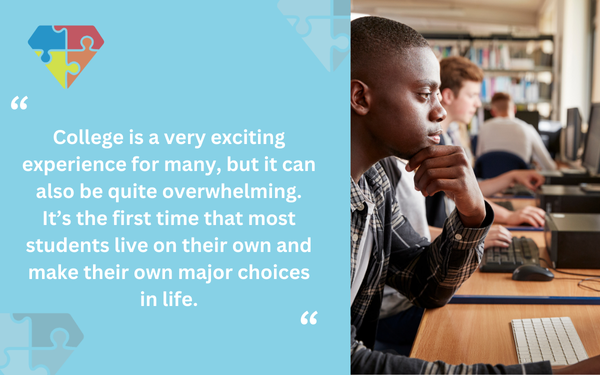How Can Autistic People Navigate College?
Children who are diagnosed with autism spectrum disorder (ASD) will likely face many challenges in life that their neurotypical peers don’t. This could include deficits with social interactions and communication, as well as challenges related to restrictive interests, repetitive behaviors and/or sensory sensitivities.
Autism can span a very wide spectrum, with different people affected in dramatically different ways by their neurodevelopmental disorder. Some are nonverbal and won’t speak much at all their entire lives, for example, while others will be “high-functioning” and face much less severe obstacles to overcome to live independently.
With the right support, guidance and tools, children with autism can go on to accomplish great things. This includes excelling in school and building a successful career.
Those who have autism might be wondering how they can navigate college, which presents many challenges that even earlier schooling doesn’t, since it’s often associated with independence. Here are some tips for how autistic people can navigate college.
Table Of Contents
Understand Your Challenges and Needs
To navigate college successfully with autism, you must first understand what your specific challenges and needs in life are. Take a comprehensive look at all the things you typically struggle with on a daily basis — both in your academic as well as personal life.
Do you need and get extra time to complete exams, for example? Do you often have trouble staying on task or meeting deadlines unless you get a lot of support?
Knowing this information way in advance will help you seek out the support and tools that you need. For instance, if you get extra time to take exams in high school now, you’ll need to know where to go and what to do to request similar accommodations in college.
If you struggle with staying on task or meeting deadlines, you may want to bring multiple alarm clocks or set up multiple calendar reminders for your responsibilities as a college student throughout the day.
Find the Right School and the Right Area of Study
Finding your passion is a critical component of success in college, whether you have autism or not. It’s especially crucial for students with ASD, as diving head-first into something you’re passionate about can do wonders for your mentality and your overall success.

To that end, search for schools that offer the subject matter that you’re most interested in, whether that’s art, engineering, math, English or anything else. Once you’ve whittled down your list of potential schools to a handful, do more research on each to discover which would provide the most supportive and conducive environments to your passion and your needs.
It’s always a good idea to visit the campus in person, and meet with advisors and others at the school so you can get a sense of what life would be like there.
Seek Out Your College’s Support Team
Every college will have a special needs support department, regardless of whether it is a college specifically for autistic students or not. This department can be an invaluable resource for you.
They can help you, for example, request the proper accommodations for extra test-taking time, as mentioned above, as well as any other accommodations you might need and/or qualify for. Some students may qualify to have another person take notes for them while they attend class.
The support department can also help you coordinate with your professors about whether it would be OK to use a recording device during class so you can review what was talked about later.
The people who work for this support department can be some of your best advocates on campus.
Don’t Overcommit
College is a very exciting experience for many, but it can also be quite overwhelming. It’s the first time that most students live on their own and make their own major choices in life.

Even if you are commuting to a local college, you’ll still have much more independence than you did in high school. Plus, there will be higher expectations of you from professors, teachers and others in the community.
This alone can cause a lot of stress and anxiety, both of which are major concerns for people with autism. That’s why it’s important to take things slow and not overcommit yourself.
You may be so excited by the prospect of getting a job or joining a club, but you should ask yourself whether it’s realistic for you. It may be a good idea to experience college life first-hand for a while before deciding exactly what you want to do, and what you’re able to handle.
Remember that you may not have the same hands-on support with certain things that you did in high school and at home, or that that support will at least not be right at your fingertips every day.
By taking the proper time to adjust and settle in, you’ll be setting yourself up for success over the long-term.
Blue Gems ABA Helps Prepare Children with ASD for Success in School
Autism can affect people in dramatically different ways. Just because someone has ASD, for example, doesn’t mean they can’t attend college and excel in their studies.
Following some of the tips above will certainly help autistic people navigate college more successfully.
At Blue Gems ABA, we are dedicated to helping children with ASD prepare for success in school and live more independently. We do so by administering applied behavior analysis, or ABA therapy, on a one-to-one basis.
This science-based approach to learning and behavior helps children gain the social, communication and daily life skills with which they commonly struggle.
To learn more, please contact us today.




